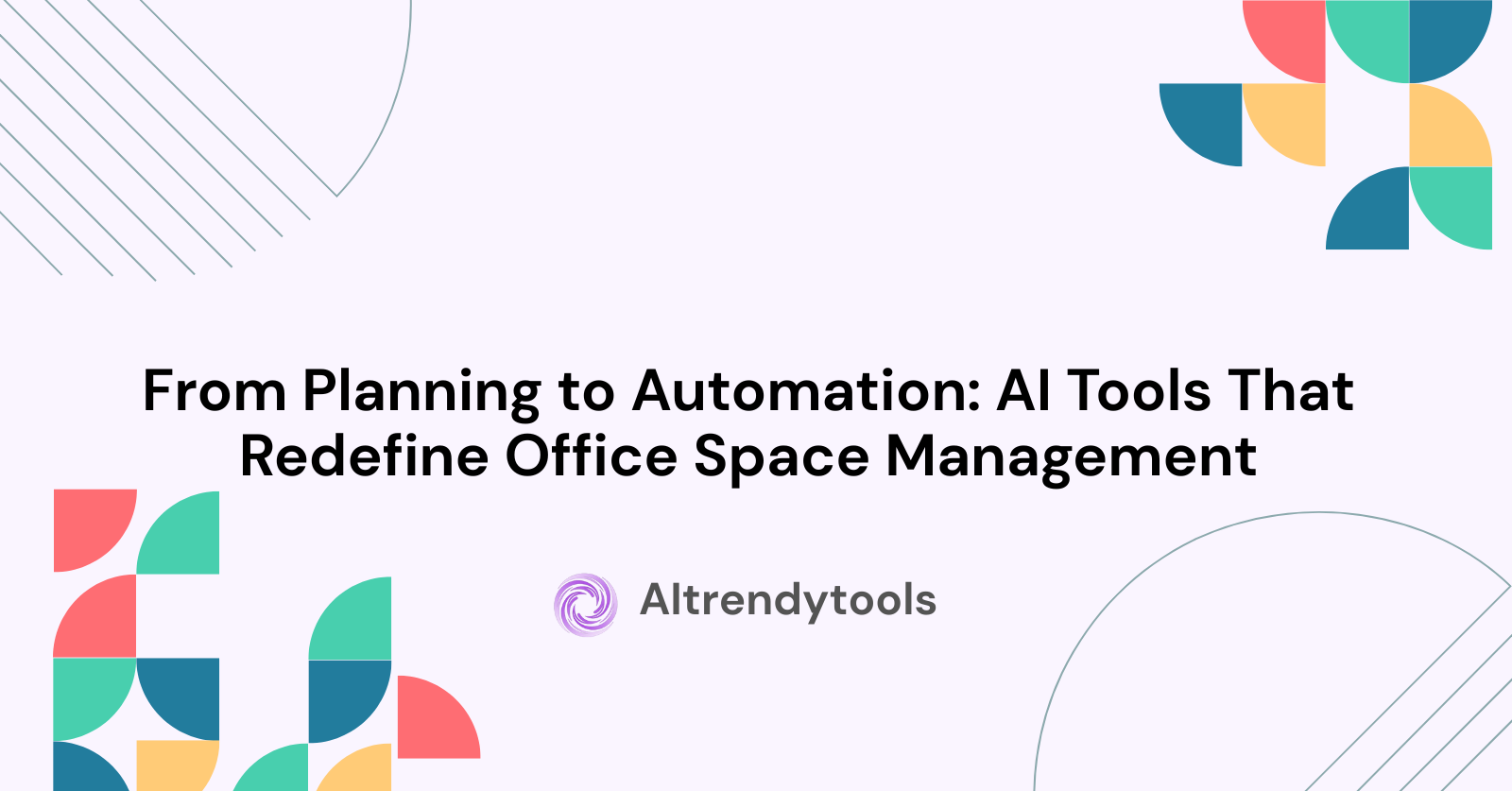🔥 AITrendytools: The Fastest-Growing AI Platform |
Write for usFrom Planning to Automation: AI Tools That Redefine Office Space Management
Discover how AI tools revolutionize office space management—boosting efficiency, cutting costs, and enhancing employee experiences in the modern workplace.
Jul 30, 2025
The modern workplace is evolving rapidly, driven by technological advancements and shifting workforce dynamics. One of the most transformative changes in recent years has been the integration of artificial intelligence (AI) into office space management software. From optimizing floor plans to automating routine tasks, AI-powered tools are revolutionizing how businesses manage their physical workspaces.
In this article, we’ll explore how AI reshapes office space management, the key tools driving this transformation, and why businesses should consider adopting these innovations to enhance efficiency, reduce costs, and improve employee satisfaction.
The Evolution of Office Space Management
Traditionally, office space management involved manual processes—spreadsheets for tracking desk usage, paper-based floor plans, and in-person facility tours to assess space utilization. These methods were time-consuming, prone to errors, and lacked real-time insights.
The rise of smart buildings, IoT sensors, and AI-driven analytics has changed the game. Today, businesses can leverage data-driven strategies to optimize space usage, enhance workplace experiences, and predict future needs.
How AI is Transforming Office Space Management
1. Smart Space Planning and Optimization
AI-powered office space management software uses machine learning algorithms to analyze occupancy patterns, employee behavior, and workflow requirements. These tools generate optimized floor plans that maximize space efficiency while ensuring health and safety regulations compliance.
For example, AI can suggest desk arrangements that minimize distractions, recommend collaborative zones based on team interactions, and adjust layouts dynamically as workforce needs change.
2. Automated Desk and Room Booking
Gone are the days of first-come, first-served desk allocations. AI-driven platforms enable employees to book workspaces via mobile apps, considering factors like proximity to colleagues, noise levels, and natural lighting preferences.
Some office space management software solutions integrate with calendar apps to automatically reserve meeting rooms based on scheduled discussions, reducing administrative overhead.
3. Predictive Maintenance and Energy Efficiency
AI doesn’t just manage space—it also helps maintain it. Smart sensors monitor HVAC systems, lighting, and equipment, predicting maintenance needs before failures occur. This proactive approach minimizes downtime and reduces operational costs.
Additionally, AI optimizes energy consumption by adjusting lighting and temperature based on real-time occupancy data, contributing to sustainability goals.
4. Enhanced Workplace Experience
Employee satisfaction is a critical factor in productivity and retention. AI tools analyze feedback from surveys, sensors, and usage data to identify workplace pain points. Online forms can further streamline the data collection process, making it easier for AI systems to gather and interpret employee input in real time.
For instance, if employees frequently complain about a lack of quiet spaces, AI can recommend redesigning certain zones or introducing soundproof pods. Some platforms even personalize workspace recommendations based on individual preferences.
5. Hybrid Work Coordination
Managing a fluctuating in-office workforce is challenging, with hybrid work models becoming the norm. AI helps by forecasting peak office days, suggesting optimal desk-to-employee ratios, and automating shift rotations. An AI meeting teammate can seamlessly manage virtual and in-person meetings, and keep hybrid teams connected regardless of location.
These insights ensure companies maintain an efficient workspace without over-investing in unused real estate.
Key AI Tools Redefining Office Space Management
Several cutting-edge tools are leading this transformation:
1. SpaceIQ (Now part of Eptura)
A comprehensive workplace management platform that combines space planning, move management, and analytics. Its AI capabilities help organizations visualize space utilization and make data-backed decisions.
2. OfficeSpace Software
This office space management software leverages AI to automate space planning, track occupancy trends, and streamline facility requests. Its predictive analytics help businesses adapt to changing workplace demands.
3. Robin Powered
Specializing in desk and room booking, Robin uses AI to optimize workspace allocation, integrate with collaboration tools like Slack and Microsoft Teams, and provide real-time usage reports.
4. VergeSense
An AI-powered sensor platform that monitors occupancy and movement patterns. The data collected helps companies redesign office layouts for better efficiency and employee experience.
5. IBM TRIRIGA
A robust AI-driven solution for real estate and facility management, offering predictive analytics for space optimization, lease management, and sustainability initiatives.
The Future of AI in Office Space Management
As AI advances, we can expect even more innovative automation in office space management. Emerging trends include:
- AI-Powered Workplace Assistants: Chatbots and virtual assistants that handle space-related queries, bookings, and maintenance requests.
- Augmented Reality (AR) for Space Planning: AR tools allow facility managers to visualize layout changes in real time before implementation.
- Blockchain for Secure Space Transactions: Decentralized systems for managing leases, access control, and resource allocation with enhanced security.
Why Businesses Should Adopt AI-Driven Office Space Management
- Cost Savings: Optimizing space reduces real estate expenses by eliminating underutilized areas.
- Improved Productivity: Employees spend less time searching for workspaces and more time focusing on tasks.
- Data-Driven Decisions: AI provides actionable insights for long-term planning and resource allocation.
- Sustainability: Efficient space usage lowers energy consumption and carbon footprints.Also, Compare Business Energy to become more sustainable while dealing with office space management.
- Scalability: AI solutions adapt to business growth, making them ideal for expanding organizations.
Conclusion
Integrating AI into office space management is no longer a luxury—it’s necessary for businesses aiming to stay competitive in a dynamic work environment. AI-driven tools offer unparalleled efficiency and flexibility, from intelligent space planning to automated maintenance.
By adopting advanced office space management software, companies can transform their workplaces into agile, employee-friendly environments that foster productivity and innovation. The future of office management is here, and it’s powered by artificial intelligence.
Are you ready to redefine your workspace with AI? The time to automate is now.
🚀 Submit Your Tool to Our Comprehensive AI Tools Directory
Get your AI tool featured on our complete directory at AITrendytools and reach thousands of potential users. Select the plan that best fits your needs.





Join 30,000+ Co-Founders
Related Blogs
8 Best AI Logo Generators in 2026
Discover the 8 best AI logo generators in 2026 after testing 30+ tools. See why Design.com ranks #1, followed by BrandCrowd, plus detailed reviews, comparisons, and results.
Design.com: Best AI Design Tool in 2026
Is Design.com the best AI design tool in 2026? We tested its AI logo generator, website builder, business cards, brand kit, and more—read our full in-depth review.
How AI May Change the Future of Online Casinos
Discover how AI is transforming online casinos with personalized gameplay, enhanced security, smarter marketing, and improved player protection.
Submit Your Tool to Our Comprehensive AI Tools Directory
List your AI tool on AItrendytools and reach a growing audience of AI users and founders. Boost visibility and showcase your innovation in a curated directory of 30,000+ AI apps.





Join 30,000+ Co-Founders

